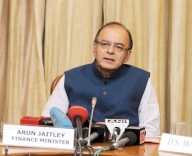 The central government on Wednesday announced the setting up of two committees to facilitate the rollout of the goods and services tax (GST) regime from April 1 next year and to propose the tax rates.
The central government on Wednesday announced the setting up of two committees to facilitate the rollout of the goods and services tax (GST) regime from April 1 next year and to propose the tax rates.
A committee headed by Chief Economic Adviser Arvind Subramanian has been formed to come up with a revenue neutral rate or a rate at which there will be no revenue losses to states under the proposed GST regime.
“A committee has been formed under the chairmanship of the chief economic advisor, ministry of finance, to recommend possible tax rates under GST that would be consistent with the present level of revenue collection of Centre and states,” the union finance ministry said in a release here.
A rate of 27 percent recommended earlier by a sub-committee was considered too high and unacceptable by the government. This committee will also analyse the sector-wise and state-wise impact of the GST on the economy.
The government has also formed a steering committee having representation from the Central Board of Excise and Customs (CBEC), the states and the Goods and Services Tax Network (GSTN).
“A steering committee been formed under the co-chairmanship of additional secretary, department of revenue, and member secretary, Empowered Committee of State Finance Ministers,” the statement said.
This committee shall monitor the progress of IT preparedness of GSTN/CBEC/Tax authorities, finalisation of reports of all the sub-committees constituted on different aspects relating to the mechanics of GST and drafting of CGST, IGST and SGST laws/rules.”
“The committee shall also monitor the progress on consultations with various stakeholders like trade and industry and training of officers,” it added. The GST Bill was last month sent to a select committee of the Rajya Sabha, which will table its report in the upper house in the next parliament session. GST is seen as the key to facilitating industrial growth and improving the country’s business climate.
By subsuming most indirect taxes levied by the central and state governments such as excise duty, service tax, VAT and sales tax, the new regime proposes to facilitate a common market across the country, leading to economies of scale and reducing inflation through an efficient supply chain.
Meanwhile, policy research and advocacy group CUTS International on Wednesday urged opposition parties to support the GST Bill. “Just because the BJP had opposed the GST when in opposition does not mean that the Congress should oppose it. Two wrongs don’t make one right,” CUTS said in a release in New Delhi. (IANS)
